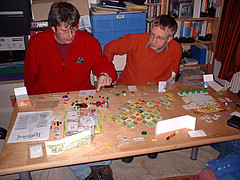Keythedral - End Game
Although the game took almost 150 mins it never dragged. There was always something to think about and downtime was a minimum. The bidding mechanism for deciding the start player for next round is quite interesting producing some odd decisions. Here we see Richard explaining how listening to the rules doesn’t actually detract from his ability to play the game with a degree of skill.
Final Scores (*denoting start player)
Richard 157, Steve 43, Garry 42, Colin 40, *Neil 32
Rating (0-10)
Colin 7.5



2 Comments:
Just to clarify what Colin said, I have played Keythedral before (about 3 years ago I think) Since playing it I have been on the lookout to get a copy to add to my games collection. Basically I concidered it to be an excellent and challenging game with hidden tactical depths that was well worth owning.
Unfortunately a few others seemed to think the same as me and secondhand copies (it was only a limited print run) became like gold dust (but unlike gold over the past few years have gone up significantly in value - I do remember seeing one for 105 euros at Essen last year!).
Luckily the game has recently been reprinted (just as well I didn't buy that 105 euro copy at Essen eh??) and I managed to pick up a copy at at Midcon early in November.
Anyway as I wanted to play it again and it was my choice I chose it as my game for Tuesday evening.
As Colin implies your early placement is important, you need to try and avoid having you villages of a given number type next to another players village of the same number type (Especially if they are on your right). Neil seemed to suffer with this through out the game.
The bidding to be start player always seemed to stay with Neil and Garry, and I was quite happy abou this as they were tending to choose the 4 & 5 villages which meant that despite being at the end of the placement sequence I able to always get one or two villagers out of these villages because of how they were positioned. In fact I always seemed to consistently get 6 around villages out (Colin seemed to get 8 or so villagers out at times!).
My only tactic during the game was to alway attempt to purchase at least one Keythedral block at each level (though I did manage 2 at the 8 level - mainly due to the wine I was hoarding). In preparation for going up each level I also made sure I had at least one of Iron, Glass or Gold behind my screen (Depending on the level) so that I could opportunity purchase anything that turned up. I got lucky with the blocks that turned up and was always able to do this.
With the last 12 block about to be purchased I was convinced that if Garry purchased it (or maybe Steve) they would pip me for the win - so I used one of the cards I had purchased earlier to move the start player to Colin so that either he or Neil could purchase the last 12 block before Garry or Steve (I didn't have enough or the correct commodities to do it myself). Luckily Neil had the goods to do what required and I managed to win the game.
Finally point tallying revealed I needn't have been so worried as I had miscalculated on the blocks Garry had purchased (I think he didn't have a 10 Block I thought he had).
All in all in excellent game and I think enjoyed by everyone except possibly Neil who did get stuffed by some bad initial village placement.
I think Neil was trying to partition off a corner of the map at the start for his exclusive use, but that’s hard to do, particularly in your first game, and if it doesn’t work, you come unstuck, as he demonstrated. I had similar problems in my first couple of games, and it seems to be a flaw in the design that you can’t recover if you go wrong in this first phase.
My plan was to ignore the low value tiles in favour of building up a stock of craft blocks, so that I could buy up the high value tiles while everyone else was trading for the right blocks. I had it in my mind that the profit you make buying the high value tiles is more than you make with the low value ones, but this isn’t the case – every tile is worth exactly twice its cost in blocks, so it’s just as good to buy a lot of small tiles as to buy a few big ones. My strategy should still have worked, but I didn’t build up a large enough stock of blocks (I wasted too many on houses that never produced). I also suffered by being on Richard’s left. Random seating order, next time, I think!
Steve
Post a Comment
<< Home